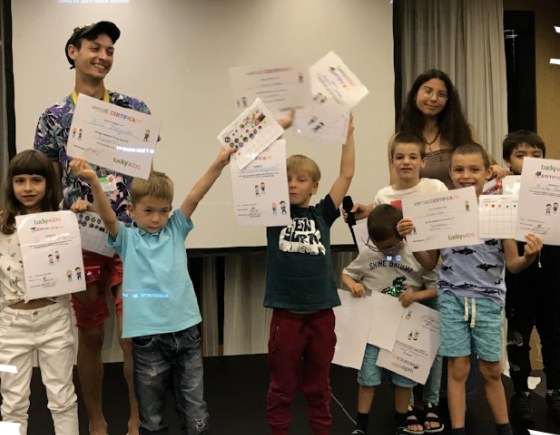Learning English can be boring and monotonous when methods based on endless repetition and memorization are applied.
Unfortunately, many language schools and camps still resort to disruptive and ineffective approaches.
One of the reasons for this is the misconception that learning is difficult and serious by nature and that if the student is having fun, then it is not real learning.
LuckyKids International Summer Children’s Language Camp, we try to avoid such vicious practices.
At LuckyKids, children learn English while playing
Our English language training system for children is at stake of the game as an alternative method of learning a foreign language that makes the process enjoyable without detracting from its effectiveness.
We know from experience that the knowledge behind emotions and experiences is the most solid and lasting.
Because it is almost always associated with excitement and positive emotions, the game is our most powerful weapon in the classroom and beyond.
The playing child is a happy child!
In LuckyKids the training is full-time, as the camp communicates ONLY in English.
Thus – imperceptibly and effortlessly – our campers learn more and more of the language they need to understand and speak if they wish to participate in the games.
Main advantages of the game method in foreign language teaching
The game method brings many benefits for children and their results in learning English at LuckyKids:
- brings dynamism and fun to the learning process
- makes the acquisition of new knowledge exciting and interesting
- provokes the imagination and creative energy of the child
- engages emotions and increases motivation to participate in the educational process
- stimulates the desire to express and achieve results
- introduces a competitive element that plays a stimulating role in learning.
The game – a main pillar in the program of children’s language camp LuckyKids
The game as an educational method can be realized in various forms.
This may include, for example, storytelling, music, movement, sports competitions, theatre, shows and more.
In LuckyKids the game is a major element of camp life and comes in the form of:
- STORY-ROLE AND CREATIVE GAMES – intensive study of English in the morning educational block, which combines conventional and innovative methods and approaches, project training, etc.
- GAMES, SPORTS AND OUTDOOR ACTIVITIES – mountain hiking, horseback riding, paintball, cycling, free games in nature and other entertainment and activities through which we promote communication, sports and active lifestyles.
- GAMES, SPORTS AND INDOOR ENTERTAINMENT – swimming and pool games, tae bo, yoga, and other sports and leisure activities on site, including a rich evening entertainment program that includes: talent show, pillow fight, treasure hunt, detective night, pajama party, neon party, etc.
At LuckyKids, we encourage children to get involved in games and other forms of entertainment, because in this way:
- share the company of the other campers and get to know them
- expand their knowledge of life, the nature and the world
- participate fully in the life of the camp
- enrich their English vocabulary and improve their communication skills.
At the same time, we use the time spent in games to show children important values such as:
- friendship
- humanity
- respect for the other
- diligence
- perseverance
- love for everything they do.
How does game contribute to the learning process in the camp?
At LuckyKids, all games and activities focus on the various components of successful and internalized English language learning.
This includes, on the one hand, reviewing, consolidating and expanding existing knowledge.
On the other hand, it unlocks the huge opportunities for the development of:
- emotional intelligence
- self-awareness
- motivation
- self-regulation
- empathy, etc.
These qualities are especially valuable for the child’s personality, as they are the basis of good communication and as such are a springboard to friendship, academic success and professional realization.
